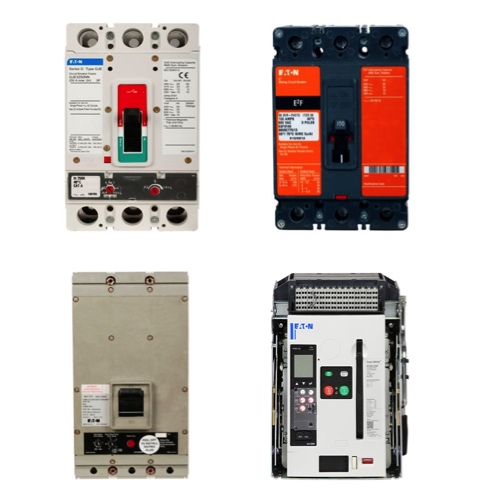Eaton Molded Case Circuit Breakers

RSP Supply carries a full line of Eaton molded case circuit breakers, including the Series C and Power Defense models, providing advanced protection and reliability across residential, commercial, and industrial environments. Built with globally rated platforms and durable molded housings, these breakers deliver consistent, long-lasting performance in demanding conditions.
Eaton’s Series C molded case circuit breakers feature both thermal-magnetic and electronic trip units, supporting multiple voltage ratings such as 240 VAC and 480 VAC. Their adjustable trip settings and compact design make them suitable for panelboards, switchboards, motor control centers, and distribution systems. Designed for flexibility and precision, the Series C line offers customizable protection and seamless integration into diverse electrical systems. The Power Defense series represents Eaton’s next-generation technology, offering intelligent electronic trip units, real-time data monitoring, and predictive diagnostics. These advanced features improve safety, enable remote management, and help reduce downtime in critical power systems. Power Defense MCCBs are globally rated, easy to configure, and built to meet the toughest electrical protection standards.
FAQs
Q: What electronic trip units are available in Eaton’s molded case circuit breakers?
Eaton’s Series G and Series C molded case circuit breakers feature advanced electronic trip units, including the 310+ and 210+ models, for precise and reliable performance.
Q: Are Eaton Power Defense molded case circuit breakers globally rated?
Yes. Eaton’s Power Defense MCCBs are part of a globally rated platform that integrates advanced technology for consistent, worldwide performance.
Q: What applications are Eaton molded case circuit breakers designed for?
They are suitable for use in residential, commercial, and industrial environments, including motor control centers, switchboards, and distribution panels.
Q: Do Eaton molded case circuit breakers offer both thermal-magnetic and electronic trip options?
Yes. Eaton’s Series C breakers can be configured with thermal-magnetic or electronic trip units, depending on application needs.
Q: What are the voltage ratings of Eaton molded case circuit breakers?
Eaton molded case circuit breakers are available in a range of ratings, including 240 VAC and 480 VAC, to accommodate diverse power system requirements.
Why Buy Eaton Molded Case Circuit Breakers (MCCBs) from RSP Supply
RSP Supply offers a full selection of Eaton molded case circuit breakers with competitive pricing, fast shipping, and expert technical support. Our team helps you choose the right breaker for your system - whether you need Series C, Power Defense, or specialty configurations. Count on RSP Supply for dependable products and responsive service to keep your electrical systems safe and efficient.

